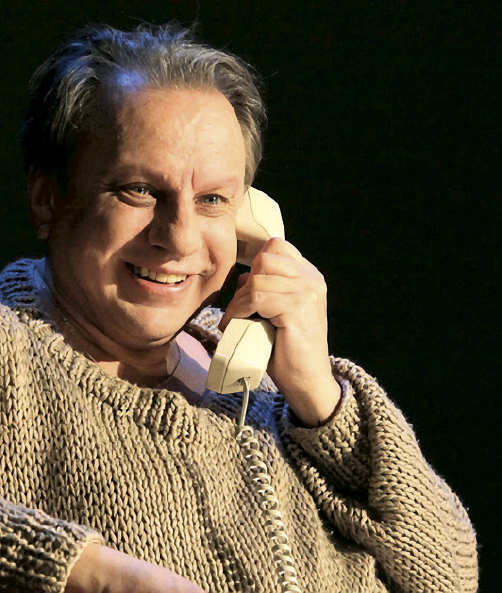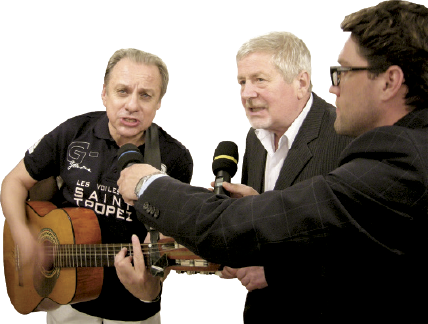
Sergey Zhuravel, the People’s Artiste of Belarus celebrates his 60th birthday
Zhuravel has enough scenic charm. He, as it said, is an actor with a God-given talent. When he was a student, critics predicted a brilliant future for him, and not unreasonably. In the 70s, being a student of the actor’s department of theatrically-art institute, at the Young Spectator’s Theatre, he played the big role of Sergey Tyulenin in the performance of Young Guards (in foreign version — a performance about young resistance members in days of the Great Patriotic War). After his graduation at the institute, Sergey was taken on with the staff of the theatre. I will never forget, as his young guard Serezhka Tyulenin got out, more exactly rushed out to the stage, he hardly touching the boards. And how wonderfully this student played guitar and sang — the owner of an outstanding baritone! What a voice, what grace, and the critics admired him. The theatre’s spectator audience — children and teenagers, whose attention can be captured only by actors with powerful energy, understanding what they play, — faded, when Zhuravel appeared on the stage. The laughter calmed down, the remarks disappeared as the play progressed, and the waves of silence rolled in the hall. In such cases, people say that the actor is able to win the audience. More than once I have asked Sergey how he manages to do this. And more than once he has answered — I do not know. And he gave an example with his son Anton who is able to repair a motorbike, and a tape in the kitchen which for Sergey is absolutely incomprehensible. And for the son, the actor’s occupation equally so. Sergey told me, that once, when he worked at the Young Spectator’s Theatre, Anton watched a performance of The Rainmaker and came backstage to his father with a question, ‘How do you do this? You stand and you are silent, but something is happening with me and with you…’. Over the course of time, when I became skilled at the theatre and having learnt to understand actor’s handwriting, I understood that intense internal life of the character, his emotional experience, his personal story, bewitches spectators and causes reciprocal feelings even more than the outer effects which at times are and end in itself at this or that director. Once, Sergey Zhuravel told me how he worked on the role of the Censor in Academy of Laughter, staged at the theatre by Modest Abramov on the play-parable of the Japanese playwright Koki Mitani. In order to justify the too serious attitude of his own hero to the creativity, not understanding how it is possible to write comedies during wartime, and his huge interest in the young man who wrote this play, Zhuravel thought up a biography to the Censor. Say, the Censor had a son who died during the war; therefore the Censor is so serious about everything that concerns the war theme, including the comedy of the young author. That’s how Zhuravel completed the destiny of the hero, he thought up a biography for him. Therefore the image turned out not flat, but many-sided, and generated sympathy.
We have been friends since that time of the Young Spectator’s Theatre. Sergey and his actor-friends more than once ran into the academic part of the theatre where I worked at that time. Certainly, we discussed performances, shared opinions how to hold the day of Young Spectator’s Theatre in this or that Minsk school, or a discussion of the premiere of a performance just after its termination. It was like this with the performance of Felix Salten’s play, Bambi, which impressed the theatrical public. I remember how we, teachers and literary part helped to manually knit costumes from rope for the actors playing deer, before the show ran. It was the request from the producer of the performance, Yuri Mironenko — to help services of the theatre, which always have a hectic time before premieres, it is called the rush and busy time. After the premiere of the performance of The Seagull by Anton Chekhov and directed by Grigory Borovik in which Sergey played the role of Treplev when he was just 22 years old, we said that young age would not be an obstacle for big and serious roles — after all it is the study at school of acting technique.

For the role of Bambi, Zhuravel, among other main actors, received the prestigious award in that Soviet period of Lenin Komsomol of Belarus, which was handed over to young experts for various achievements in the sphere of art, literature and sciences. In the summertime, actors went in pioneer camps with concerts which I had to organise. In their programmes, Zhuravel took the most active part. He never refused to participate in this or that creative meeting if they did not coincide with his performances.
His roles, as a rule, are always successful; at the Young Spectator’s Theatre, at the Youth Theatre, and at the Yanka Kupala Theatre where Sergey Zhuravel serves now to the Melpomene. As he himself said, he has been lucky more than once with kind people and professionals. Among them is his first teacher, teachers at the institute, and directors, among which is Nikolay Pinigin, the present art director of Yanka Kupala Theatre. Sergey has played many versatile roles — Salvador Dalí, Scapin, Tartuffe… He also acts in films, especially recently, though he does not consider himself a film actor. I liked his one of outstanding works — Pan Ostrovsky, one of guests of the protagonist — the Count, in the film, Massacre by Russian film director, Andrey Kudinenko. Actor’s organics and skill do not let Zhuravel down in the cinema. In spite of the fact that he is strongly attracted to the theatre, he is also successful with film roles. last year, in The Ballad of Uhlans by director Oleg Fesenko, he played Mikhail Illarionovich Kutuzov — the great Russian commander in the patriotic war of 1812. And though the theatre is now on holiday, Sergey is working — actively acting in films. Just recently, he returned from shooting of a film by Alexander Yefremov, made by Belarusfilm, the working name of which is All Treasures of the World, having played a role of a negative character — Krutov. In the film by Igor Chetverikov, called State Border, which is now being shot in Bobruisk, he plays a rural workman — Uncle Misha. While in the film of Alexandra Butor — Sweet Farewell of Vera, he will act the part of the restaurant owner. These are the versatile cinema roles of Sergey Zhuravel which we will see in the future. I hope that in these works, he will discover in himself new actor’s sides. Belarusfilm producers are people whose name are well-known, who declared about their own professionalism and talent. Zhuravel, if he works with professionals, frequently admires them. And, for certain, they hear each other. In connection with his attitude to professionalism, I recollect one example with a joiner, virtuoso of his own trade, about whom Sergey spoke with delight. Once he decided to make a repair on his summer cottage, thinking that he himself would cope with joinery. But far from it, the porch needed more skilful hands. He called the joiner, and observing how confidently the latter, with just several blows of an axe, made the work with what he was busy for a long time, came to the conclusion that both repairs, and work on his car should be trusted to professionals. Since then he follows this conclusion.

Sergey Zhuravel and Alexey Dudarev are performing songs of their studentship. Actor Pavel Kharlanchuk is at the right
As for his native Kupala Theatre, in autumn, Nikolay Pinigin’s new project — The Seagull by Chekhov will be launched there. And though the cast has not been carried out yet, it is assumed that Sergey Borisovich will play the role of the doctor, Dorn. Thus, after forty years he will plunge, once again, into the difficult, private world of one more of Chekhov’s heroes.
Personally, I’ve never seen negative critiques about his performances in the media. However, sometimes I write about Zhuravel with piety. As well as this time, I want to say kind words about this talented actor. And there is an occasion for that. It’s his birthday, after all.
So, what did Sergey Zhuravel do on this holiday day? Of course, he performed; appearing on stage in Cabaret by Pinigin in several roles: provincial Jews, a Polish pan-dandy and the Belarusian in a linen shirt. Creating these versatile images, he showed the highest professionalism and his talent to transform. After the show, Sergey Borisovich Zhuravel accepted congratulations.
“Your brilliant actor’s activity, bright talent, masterly skill of transformation and your artistic means make you a real star of Belarusian theatre and cinema, the artiste whom spectators sincerely love for truth of life in art.” This was said in a message of greeting from President Alexander Lukashenko which was read by the first Deputy Minister of Culture, Irina Driga. As the Head of State noted, the roles created by Sergey Zhuravel in performances based on works of Belarusian and foreign authors, became a bright and original page of the national theatrical art and made a considerable impact on his further development. The Minister of Culture, Boris Svetlov, and the Chairman of the Union of theatrical figures playwright, Alexey Dudarev and other representatives of the theatrical community congratulated Sergey Borisovich.

Scene from a performance of Cabaret
As far as I know, actors adore working with Zhuravel, because he listens and makes them feel a part of the group. His duet in Cabaret with Viktor Manaev, the People’s Artiste of Belarus, is the acknowledgement of that. Ah, how wonderfully both of them played that day! There was an impression that both of them plunged into their own roles, savoured each word in the dialogue. And they joked so much that the hall roared with laughter. And here is what Olga Klebanovich, the People’s Artiste of Belarus says about Sergey, “I like to visit performances where Zhuravel acts. Sergey’s charm is so great that, apparently, the auditorium breathes together with him, watches his every movement, feeling pleasure from meeting with such a big actor.”
At a stand-up party, which was carried out after end of the performance, Olga Klebanovich recollected how great Sergey is in the role of Kaloshnitsa, a box for footwear, in the performance-enterprise Yellow Boot on Thick Sole. And I am impressed by Olga’s opinion about Zhuravel as an actor with a variable soul, who is able to skilfully fill his images with rich internal life.
Many warm speeches were made about him from visitors, among whom were friends and fellow students — Viktor Gudinovich, the actor of Russian Theatre and Alexey Dudarev. With them, with a guitar in hand, Zhuravel sang songs from their student’s youth. Sergey’s songs are to all our taste and we with sang along with him with pleasure. During that moment, it seemed as if there toe road of life was not that long, and the phrase, which is used to death ‘everything ends’ also seemed not meaningful. Alexey Dudarev, after a song from the film Sannikov’s Land ‘All was, all was and ended …’, said how he was thinking something himself — nothing ends — and I understand him, because during such moments where feelings are lifted by memories of youth, it seems to me that between the past and the present there is no timespan. The words from another song from the same film, one of Zhuravel’s favourites and very popular in the 70s, are also poignant ‘there is only an instant between the past and future, it is called life...’.
By Valentina Zhdanovich











